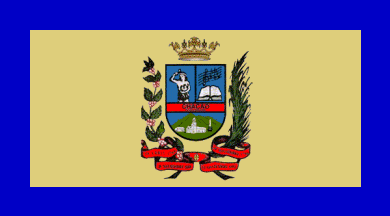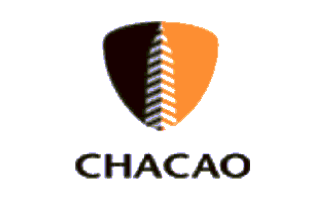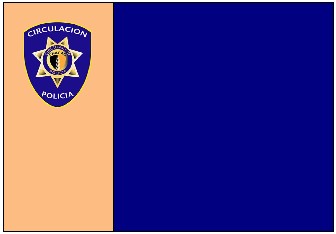 klaus-michael schneider
klaus-michael schneider
Keywords: miranda | chacao |
Links: FOTW homepage | search | disclaimer and copyright | write us | mirrors

Last modified: 2021-08-26 by  klaus-michael schneider
klaus-michael schneider
Keywords: miranda | chacao |
Links: FOTW homepage |
search |
disclaimer and copyright |
write us |
mirrors

by Blas Delgado Ortiz, 24 May 2002
See also:
Description of the Flag of Municipio Chacao, Miranda at <www.chacao.gov.ve>:
"ARTÍCULO 3: Se crea la Bandera del Municipio
Chacao, la cual tiene una dimensión de dos metros con dos
centímetros (2,02 mts) de largo y un metro con doce centímetros
(1.12 m.) de ancho, y esta formada por dos colores azul y beige.
el color azul que le sirve de fondo, en una franja alrededor de
la misma de quince centímetros (15 cm.) de ancho, que simboliza
el cielo de Chacao; el color beige, en una extensión de un metro
con setenta y dos centímetros (1.72 m.) de largo y ochenta y dos
centímetros (82 cm) de ancho, reproduce el color de la Bandera
del Estado Miranda. en el centro de color beige, lleva el Escudo
de Armas del Municipio Chacao y en sus bordes, flecos de color
oro."
Pablo Acosta Ríos, 12 May 2002
The flag of Chacao, Miranda, following the description in the
web. The size of the Coat of Arms in the
center is hypothetical.
Blas Delgado Ortiz, 24 May 2002

by Raul Jesus Orta Pardo, 17 July 2004
The conjunctural flag of the Mayorship usually is a cloth with
approximated ratio 2:3 loading on the center the corresponding
Logotype. There are diverse versions because logotype is placed
on different colors (white, blue, yellow, green) and the letters
are contrasted with the background whilst logotype stays equal:
escutcheon of with form of almond divided per pale or vertically
into two plane quarters: Saber (black) to the dexter and Orange
to the sinister, all superimposed by a super streamlined and
kinetic representation of the Obelisk located on Plaza Francia
(France Square) of Altamira (place of the Municipality) in Argent
(white) and Iron (gray) disposed in pale, that is to say,
vertically. The same configuration of the logo is lent to be
heraldically described although certainly isn’t a Coat of
Arms if we rely on the strictly heraldic rules.
Raul Jesus Orta Pardo, 17 July 2004
Coat of Arms of the Chacao Municipality in the Venezuelan
State of Miranda.
Generic Description The Chacao Municipality is located on the
Miranda State and is built-in also to the Metropolitan District
of Caracas. Its Shield of Arms is a Spanish shape per fess,the
chief per pale. The first quarter in azure loads the figure of
Chacao: Indian Chief whose name honors the region, that raises
with its right hand a macana or native stick whereas with the
left hand it maintains two small Indians rescued of hands of the
Spaniards. The second quarter, also in azure, shows an opened
silver (white) book, symbol of the universal culture, on which
appears a pentagram with musical notes in sable (black) that
symbolizes the Music School of Chacao: important and old
educative center of the locality. The third quarter, also in
azure, loads the representation of the old town with the
"Iglesia de San José") (Saint Joseph Church); the
"Obelisk": emblematic monument located in "Plaza
Altamira" ("Altamira Square") and to the bottom, a
green mountain that remembers the "Parque Nacional El
Avila" (El Avila National Park") who constitutes the
North of the Municipality. Complete the coat of arms a diminished
fess in gules (red) with the inscriptions "CHACAO" and
"ESTADO MIRANDA" (Miranda State) in Sable letters for
remind the place and the geopolitical entity whose its belongs.
As external ornaments appear the crown of the first Marquess of
Socorro, founder of the town that gave origin to Municipality. To
the dexter, appears a coffee branch that symbolizes the first
harvest of this fruit in Venezuela for industrial aims. To the
senester, a palm branch that remembers "Los Palmeros"
(The Palmers): one old popular and characteristic society of the
region that is dedicated to as much collect palm branches and
leaves in Avila Mountains for the commemoration of the Easter in
its locality as in the rest of the metropolitan region. Under the
base, a red pennant join the vegetal branches and carry to the
center a cross of Santiago (also called Saint James in English)
that belonged to the founder of the town Don Jose Solano y Bote,
whereas it shows the following mottoes: 19 de April de 1698
(April 19th, 1698), Foundation of the Parish of San José de
Chacao; 30 de Septiembre de 1769 (September 30th, 1769),
establishment of the limits of the current Municipality; 26 de
Noviembre de 1880 (November 26th, 1880), date into which Chacao
becomes Foreign Municipality and 13 de Noviembre de 1991
(November 13th , 1991) date in which the Legislative Assembly of
the Miranda State declares its municipal autonomy. Until the
moment, ChacaoMunicipality seems not to have adopted own flag
officially.
Sources: Municipal Newspaper N° 534. Decree N°010-94.
Raul Jesus Orta Pardo, 17 November 2001

by Raul Jesus Orta Pardo, 21 June 2002
m-chp.jpg)
by Raul Jesus Orta Pardo, 21 June 2002
Flag and Emblem of the Autonomous Institute of Transport,
Transit and Circulation of Chacao Municipality of the Miranda
State.
The Flag: Attributes - It consists of a cloth with ratio 2:3,
divided in two vertical stripes: one in sand brown or beige
occupying the lateral or third at the mast and the another one in
dark blue completing the remaining thirds to the center to the
fly-end. Complements the set, the Official Emblem of the
Autonomous Institute of Transport, Transit and Circulation of the
Chacao Municipality, in all his official attributes, is placed on
the canton.
Semiology - The chromatic range of the cloth reminds the already
traditional uniform that distinguishes the Institute's personal
and which running the time it has consolidated like synonymous of
Authority, Efficiency and Respect for the Citizenship to which it
serves. The beige alludes to the sand that like a variety of
gruond symbolizes Firmness, Stability and Support. The blue
alludes to the High Ideals, Justice, Loyalty, the Perseverance
and the High Spirit of Service which animates the action and
activity of the Institute and whatever integrate it. The AITTC'
Official Emblem is the Reaffirmation of the Identity and the
Institutional Ideals.
The Emblem: Attribute - Is a French Shape with the chief-line
gold bordered, whose field in Azure (blue) shows a seven pointed
and golden star that loads in its center two concentric circles.
The interior, in Or (Gold), presents Chacao Municipality Mayor
Office's Emblem consisting of a escutcheon quartered per pale:
Sable (black) to dexter and Orange to the sinister. Over all a
high streamlined and kinetic representation of the Obelisc
located in Plaza Francia (France Square) of Altamira, (location
of the Municipality) in Argent (white) and Iron (gray) placed
pale, that is to say, vertically. The second concentric circle
seems a frame for the previous one and loads the inscriptions
"CIRCULACIÓN" (Circulation) and POLICÍA (Police)in
golden capital gothic letters. The same inscriptions also
accompany the star above and down, but are made in Argent with
the same font before mentioned.
Semiology - Or represents the Authority, the Joy, the Magnanimity
and the Constance requires for execute the assigned Mission.
Azure remembers the High Ideals, Justice, Loyalty, the
Perseverance and the High Spirit which animates the action and
activity of the Institute and of its select personal. The star
remember the brightness of personal and professional virtues of
whatever integrate the Institute with higher Integrity,
Transparency and Honesty at the time of make their work. The
Chacao Municipality Mayor Office's emblem, in its official
attributes, remembers the subordination of the Institute to its
Authorities; on the one hand and by the other, its permanent
disposition of service as much to the inhabitants as to the
passers of the locality.
Historical Synthesis - As a result of change of Municipal
Authorities, a series of Corporative Image guidelines was created
and established whose axis is the emblem with form of Coat of
Arms with the super streamlined representation of the Obelisc on
France Square of Altamira in the center. All the dependent
organizations of this Mayor Office adopted one or another way
this emblem which replaced the previous one of the last
administration. One of those organizations is the Autonomous
Institute of Transport, Transit and Circulation (IATTC in
Spanish), that taking advantage of the opportunity establishes
officially the Flag and Emblem previously described at the
beginnings of June 2002.
Raul Jesus Orta Pardo, 21 June 2002